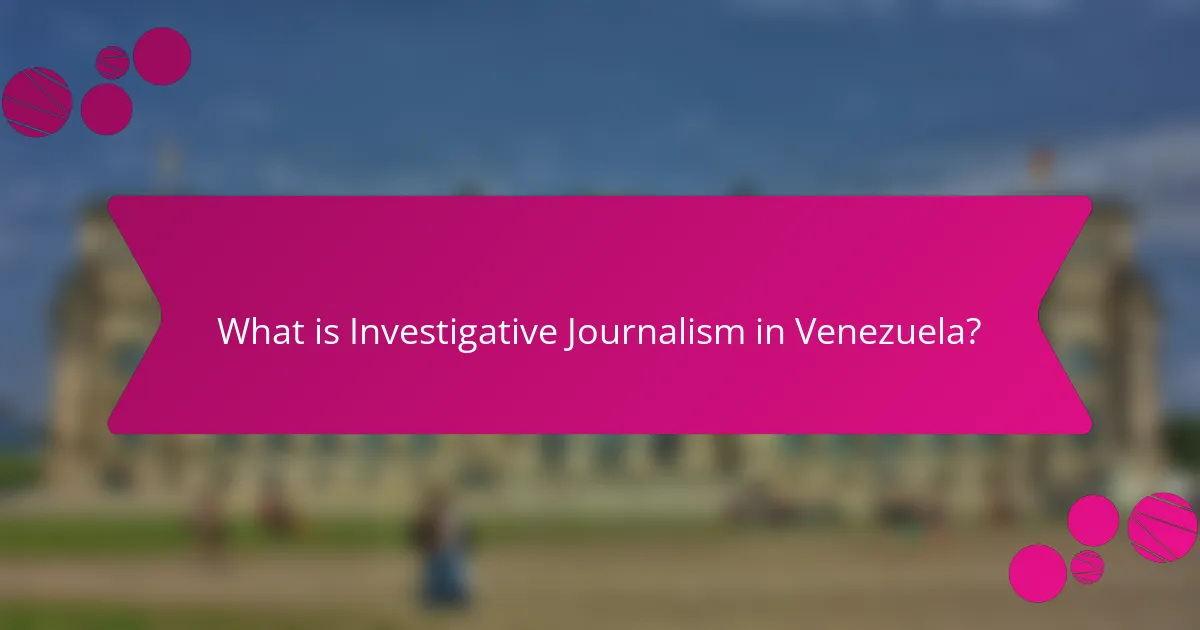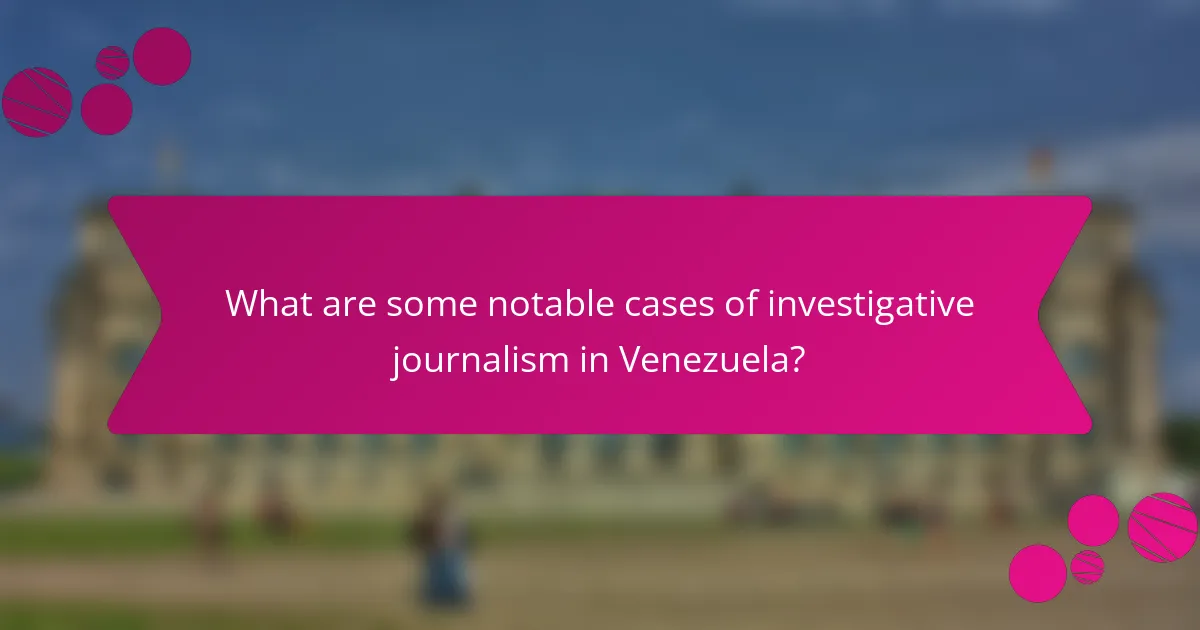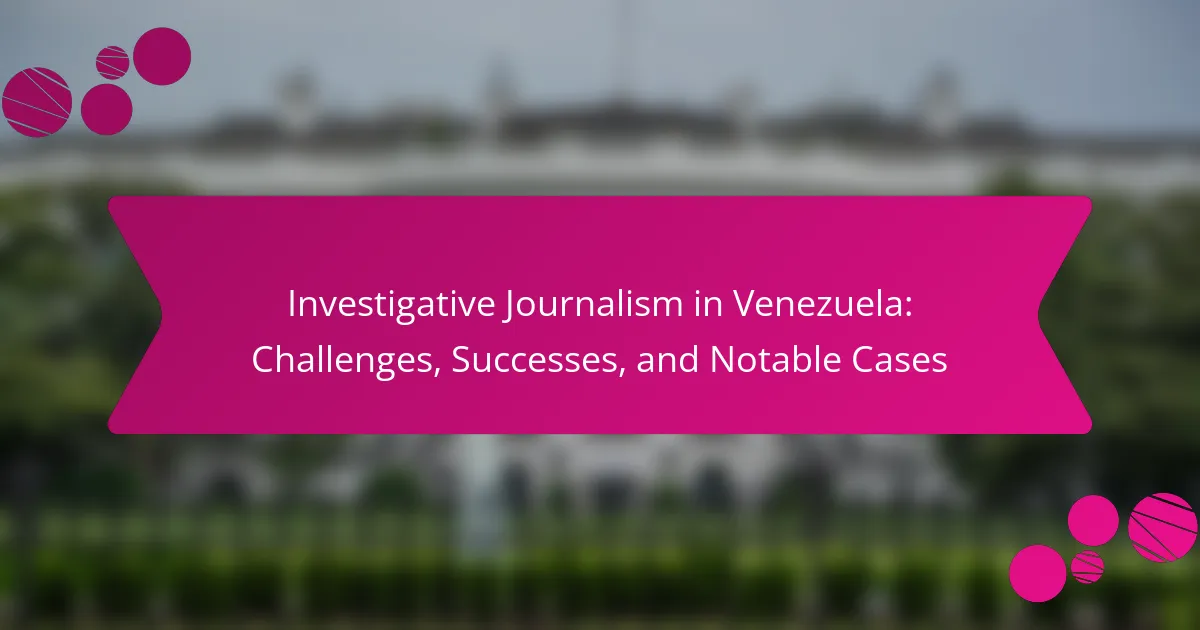
What is Investigative Journalism in Venezuela?
Investigative journalism in Venezuela is a form of journalism that seeks to uncover hidden truths and expose corruption. It often focuses on issues such as government misconduct, human rights violations, and social injustices. Journalists in Venezuela face significant challenges, including censorship and threats to their safety. The country’s political climate has made it increasingly difficult for reporters to operate freely. Despite these obstacles, some journalists have successfully reported on critical issues, bringing attention to abuses of power. Notable cases include investigations into corruption within the government and the military. These efforts highlight the resilience of journalists in a restrictive environment.
How has the landscape of investigative journalism evolved in Venezuela?
The landscape of investigative journalism in Venezuela has significantly deteriorated over the past two decades. Increasing government repression has led to a hostile environment for journalists. Censorship, intimidation, and violence against reporters have become common. The government has enacted laws that restrict press freedom and criminalize dissent. As a result, many journalists have fled the country or ceased their work. Despite these challenges, some media outlets continue to operate underground or from abroad. They focus on exposing corruption and human rights abuses. The rise of digital platforms has also provided new avenues for investigative reporting. Nevertheless, the overall situation remains precarious for those pursuing investigative journalism in Venezuela.
What historical events have shaped investigative journalism in the country?
The historical events that have shaped investigative journalism in Venezuela include the Caracazo in 1989. This civil unrest led to increased scrutiny of government actions and prompted journalists to investigate corruption and human rights abuses. The 1999 Bolivarian Revolution marked a significant shift in media dynamics. Government control over media increased, impacting press freedom and investigative efforts. During the Chávez administration, laws were enacted that restricted journalistic independence. The 2014 protests against the government further fueled investigative journalism, as reporters sought to expose state repression. The economic crisis has also intensified the need for accountability, driving journalists to uncover corruption and mismanagement. These events collectively influenced the evolution and challenges faced by investigative journalism in Venezuela.
What role do media organizations play in investigative journalism?
Media organizations are essential in investigative journalism. They provide the necessary resources for in-depth research. This includes funding, access to technology, and skilled personnel. Media organizations also offer a platform for disseminating findings to the public. They help ensure accountability by exposing corruption and injustice. Historical examples, such as the Watergate scandal, illustrate their impact. Investigative journalism led by media organizations can prompt legal and political changes. In Venezuela, media organizations face significant challenges, yet they continue to play a crucial role in uncovering the truth.
What are the main challenges faced by investigative journalists in Venezuela?
Investigative journalists in Venezuela face significant challenges including censorship, threats, and a hostile political environment. Censorship limits access to information and restricts the publication of critical reports. Threats from government officials and criminal organizations create a dangerous atmosphere for reporting. The political environment is characterized by repression and intimidation of journalists. Economic instability further complicates the situation, making it difficult to fund investigative work. According to the Committee to Protect Journalists, Venezuela is one of the most dangerous countries for journalists. These factors collectively hinder the ability to conduct thorough investigations and report freely.
How do political pressures impact investigative journalism?
Political pressures significantly hinder investigative journalism. These pressures can manifest as government censorship, harassment, or threats against journalists. In Venezuela, journalists face intimidation from authorities. This environment leads to self-censorship among reporters. Investigative stories may be abandoned due to fear of repercussions. For example, the shutdown of media outlets limits reporting on corruption. The decline in press freedom affects the public’s right to information. According to the Committee to Protect Journalists, Venezuela ranks among the most dangerous countries for journalists. Such conditions undermine the role of journalism in holding power accountable.
What threats do journalists encounter while reporting in Venezuela?
Journalists in Venezuela face multiple threats while reporting. These threats include harassment, intimidation, and physical violence. Government censorship restricts access to information. Journalists also encounter arbitrary detention and legal persecution. The political climate fosters an environment of fear. Reports indicate that many journalists have fled the country due to these dangers. According to the Committee to Protect Journalists, Venezuela is one of the most dangerous countries for reporters. These conditions severely hinder press freedom and investigative journalism.
What successes have been achieved in investigative journalism in Venezuela?
Investigative journalism in Venezuela has achieved significant successes despite challenges. Notable investigations have exposed corruption within the government and various industries. Journalists have uncovered human rights violations and abuses, bringing international attention to these issues. Reports on drug trafficking networks have led to arrests and policy changes. Investigative outlets like Armando.info and El Pitazo have gained recognition for their work. Their efforts have won prestigious awards, highlighting their impact on society. These successes demonstrate the resilience and importance of investigative journalism in Venezuela.
What notable investigations have led to significant societal change?
Notable investigations that have led to significant societal change in Venezuela include the uncovering of corruption within the government and the drug trade. Investigative journalists exposed the involvement of high-ranking officials in drug trafficking. This led to public outcry and demands for accountability. The “Narco-Politics” investigation revealed links between government officials and drug cartels. It prompted international scrutiny and sanctions against implicated individuals. Another significant investigation was the reporting on human rights abuses by security forces. This coverage raised awareness and spurred protests against government actions. The work of journalists has been crucial in informing citizens and influencing policy changes.
How have journalists overcome challenges to achieve success?
Journalists in Venezuela have overcome challenges to achieve success by employing various strategies. They have utilized digital platforms to disseminate information widely. This approach allows them to bypass state-controlled media restrictions. Collaborations with international organizations have provided resources and support. Training programs have enhanced their investigative skills. Journalists have also relied on anonymous sources to protect their identities. Furthermore, leveraging social media has helped them reach larger audiences. These methods have proven effective in ensuring the continuation of investigative journalism in a challenging environment.

What are some notable cases of investigative journalism in Venezuela?
Notable cases of investigative journalism in Venezuela include the uncovering of corruption within the government and the military. Journalists from outlets like Armando.info have exposed extensive corruption linked to food distribution programs. In 2018, they revealed how officials misappropriated funds intended for food aid. Another significant case involved the investigation into the violence and human rights abuses by security forces. The website Efecto Cocuyo has reported extensively on these issues, providing critical information to the public. Additionally, the work of journalist Luz Mely Reyes has highlighted the struggles of independent media in Venezuela. Her investigations into the political landscape have garnered international attention. These cases demonstrate the resilience of journalists in the face of significant risks.
How do these cases illustrate the challenges and successes of investigative journalism?
Investigative journalism in Venezuela illustrates significant challenges and notable successes. The challenges include government censorship and threats against journalists. For instance, the Venezuelan government has repeatedly harassed and detained reporters. This creates a hostile environment for uncovering the truth.
On the other hand, successes are evident in cases where journalists have exposed corruption. Investigative reports have revealed embezzlement and mismanagement of public funds. These findings have led to public outcry and international attention.
The resilience of journalists in Venezuela showcases their commitment to accountability. Despite the risks, they continue to pursue stories that matter. Their work often inspires others to advocate for transparency. Overall, these cases highlight both the difficulties and triumphs in the realm of investigative journalism.
What specific case studies highlight the impact of investigative journalism?
One specific case study that highlights the impact of investigative journalism is the “Venezuelan Oil Scandal.” Investigative journalists uncovered massive corruption in the state oil company, PDVSA. This investigation revealed that billions of dollars were misappropriated. The findings led to public outrage and demands for accountability. Another notable case is the “Operation Alacrán.” This investigation exposed a network of bribery involving government officials and businessmen. The revelations prompted legal actions against several implicated individuals. These case studies demonstrate the crucial role of investigative journalism in promoting transparency and justice in Venezuela.
What lessons can be learned from these notable cases?
Notable cases in investigative journalism in Venezuela highlight the importance of resilience and adaptability. Journalists face significant risks, including censorship and violence. These challenges necessitate innovative approaches to gather and disseminate information. Collaboration among journalists can enhance safety and resource sharing. Utilizing digital platforms can help bypass traditional media restrictions. Additionally, thorough fact-checking remains crucial for credibility. Engaging with the community fosters trust and support for investigative efforts. Lessons learned emphasize the need for ongoing training in security and ethical reporting practices. These insights are vital for sustaining journalism in oppressive environments.
What role does international support play in Venezuelan investigative journalism?
International support plays a crucial role in Venezuelan investigative journalism. It provides funding, training, and resources essential for journalists facing threats. Organizations like the International Federation of Journalists offer safety training and legal assistance. This support helps journalists report on corruption and human rights abuses. In 2020, the Inter-American Press Association reported increased international funding for Venezuelan media outlets. Such backing enhances the capacity of local journalists to produce impactful stories. Additionally, international collaborations can amplify the reach of investigative work. This exposure is vital in a country where local media faces censorship and intimidation.
How have global organizations assisted journalists in Venezuela?
Global organizations have assisted journalists in Venezuela through funding, training, and advocacy. They provide financial support to independent media outlets facing economic hardships. Organizations like the Committee to Protect Journalists (CPJ) offer resources for safety and legal assistance. Training programs enhance journalists’ skills in investigative reporting and digital security. Advocacy efforts aim to raise awareness about press freedom violations in Venezuela. Reports from these organizations highlight the dangers journalists face, influencing international pressure for reforms. This support is crucial for sustaining independent journalism in a challenging environment.
What are the implications of international collaboration for local journalism?
International collaboration enhances local journalism by providing access to resources and expertise. It allows local journalists to share information and best practices with their international counterparts. This exchange can lead to more comprehensive reporting on global issues affecting local communities. Additionally, international partnerships can help local journalists gain visibility and credibility. For instance, collaborative investigations can attract attention from wider audiences and media outlets. This increased exposure can lead to greater support for local journalism initiatives. Furthermore, international collaboration can facilitate funding opportunities for local projects. Overall, such collaborations strengthen the capacity of local journalism to address pressing issues effectively.

What are the future prospects for investigative journalism in Venezuela?
The future prospects for investigative journalism in Venezuela are challenging yet hopeful. The political climate remains hostile towards independent media. Journalists face threats, censorship, and violence. Despite these challenges, many journalists continue to report on corruption and human rights abuses. International support and digital platforms provide new avenues for dissemination. Grassroots movements also help amplify investigative efforts. The resilience of Venezuelan journalists is crucial for maintaining accountability. Continued advocacy for press freedom can lead to improvements in the landscape.
How can investigative journalists navigate the current environment?
Investigative journalists can navigate the current environment by leveraging digital tools and secure communication methods. Utilizing encrypted messaging apps ensures confidentiality during sensitive discussions. Employing VPNs helps protect online activities from surveillance. Journalists should also collaborate with international organizations for support and resources. Accessing training programs enhances skills in data analysis and digital security. Networking with other journalists fosters sharing of best practices and strategies. Staying informed about legal protections and risks is crucial for safe reporting. These strategies enable journalists to effectively gather information and report on critical issues despite challenges.
What strategies can be employed to enhance safety and effectiveness?
Implementing comprehensive safety protocols enhances safety and effectiveness in investigative journalism. Training journalists in risk assessment is crucial. This includes recognizing potential threats in various environments. Establishing secure communication channels protects sensitive information. Utilizing encryption tools ensures confidentiality during reporting. Collaborating with local organizations can provide critical support and resources. Conducting thorough background checks on sources enhances credibility and safety. Regularly evaluating safety measures allows for timely adjustments in response to emerging risks. These strategies collectively improve the safety and effectiveness of investigative journalism in challenging environments like Venezuela.
What can aspiring investigative journalists learn from the Venezuelan experience?
Aspiring investigative journalists can learn the importance of resilience and adaptability from the Venezuelan experience. Journalists in Venezuela face significant risks, including censorship and violence. They often operate under oppressive regimes that limit press freedom. This environment teaches the value of innovative reporting techniques. For example, many journalists use digital security measures to protect their sources. They also leverage social media to disseminate information quickly. This experience highlights the necessity of building a network of trusted contacts. Furthermore, the Venezuelan experience underscores the importance of thorough fact-checking amid misinformation. Overall, resilience, adaptability, and innovation are crucial lessons for aspiring investigative journalists.
What best practices can be adopted from successful investigative efforts?
Successful investigative efforts adopt several best practices. Thorough research is essential to gather accurate information. Collaboration with other journalists enhances resource sharing and expertise. Maintaining ethical standards builds credibility with the audience. Utilizing data analysis tools can uncover hidden patterns in information. Engaging with the community provides valuable insights and leads. Effective storytelling techniques help convey complex issues clearly. Regular training and professional development keep journalists updated on best practices. These practices have been proven to yield impactful and credible investigative work.
How can new journalists prepare for the challenges of the field?
New journalists can prepare for the challenges of the field by developing strong research skills. They should practice verifying information from multiple sources. Understanding the legal landscape is crucial, especially regarding press freedom in Venezuela. Familiarity with digital tools enhances their ability to gather and analyze data. Networking with experienced journalists provides valuable insights and mentorship. Engaging in continuous education keeps them updated on industry trends. Learning about ethical journalism is essential to maintain credibility. Finally, resilience and adaptability are vital traits for navigating unpredictable situations in the field.
Investigative journalism in Venezuela focuses on uncovering hidden truths, exposing corruption, and addressing human rights violations despite facing significant challenges such as censorship and threats. The article examines the evolution of this field over the past two decades, highlighting historical events that have shaped its landscape, the critical role of media organizations, and notable successes achieved by journalists. Additionally, it discusses the various threats reporters encounter, the impact of political pressures, and the importance of international support. Case studies illustrate both the challenges and triumphs of investigative journalism, providing insights into future prospects and strategies for aspiring journalists in this restrictive environment.
